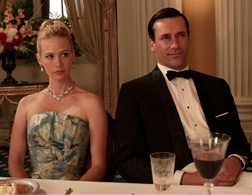Mad Men, Season 3
Week 10: Why Is Don Such A Hoarder?
Dear Julia and John,
OK, OK, I cannot tell a lie. I may have telephoned the Draper house last night.
Jeez Louise, what an episode! Don upbraids Kinsey for an Aquanet pitch with too much plot, suggesting that each time Kinsey says, "and then," viewers will tune out. But plot density is what makes the best Mad Men episodes so good. Perhaps the rote infidelities last week were just a chance for Weiner and the team to catch their breath before the big push to the end of the season. Just watching the episode last night—tracking each convolution and its possible consequences—felt downright athletic.
The biggest question before us, it seems to me, is whether having bitten the apple and peered into Don's drawer, Betty Draper is left with questions or with answers. Don's back story is so improbable that Betty would have to be pretty quick on the uptake to piece it together on the basis of the available evidence. Could she possibly extrapolate, from old photos of a kid who looks like Don, but is labeled "Dick," and from the his-and-his dog tags, that her husband appropriated the identity of a dead man? Or is she left knowing for certain only that the Decree of Divorce means Don has been married before and wondering who this Whitman character is? One thing seems clear: Men who stash old identities and stacks of cash in their desks have a fugitive whiff about them. (That drawer looks an awful lot like Jason Bourne's deposit box in Zurich.) It must be unsettling for Betty to realize her husband is ready to split in 30 seconds flat—just as soon as he feels the heat coming around the corner.
"You can't frame a phone call," Don observes, but you can't be framed by one, either. A telegram's not the only thing that lasts forever: Dog tags and family photos do, too. Which spurs the question: Why is Don such a hoarder? This is the second time he's been burned by his little box of secrets. Why not destroy the evidence? Is he just an incurable nostalgic, prone to poring over yellowed snapshots of bygone days? Or does the drawer bespeak a deeper ambivalence about Don's new identity—is he reserving the right to become the dustbowl dweeb Dick Whitman once again?
I loved the Western Union scenes as well, John, and not just for the priceless moment when Peggy burps into the Dictaphone, instinctively covers her mouth, then says, into the mic, "Sorry about that, Olive."
Beware the janitor with a bad memory. (Don't the Chinese say that, too?) I can never get enough of ole' guignol Kinsey, and this episode mercilessly revealed the anxiety he feels over his limited gifts. "I don't need you to put your little swivel on top of my idea," he snaps, after Peggy riffs on his "Double Date" spot. "Just because you're spontaneous and you're his favorite." Only later, after indulging his own, um, process, does Kinsey have that drunken moment of triumph, as something Achilles says sets off the kind of chain reaction epiphany that only Don and Peggy seem capable of. He's filled with a sense of inclusion: He's partaken of the mysticism that the real sages at Sterling Cooper specialize in. When Kinsey confesses to Don that the flash of genius is gone because he never wrote it down, Don just says, "I hate it when that happens." Inspiration is evanescent. Lord knows, Don's been there. Then, just as Kinsey is feeling included once again, Peggy comes up with a dazzling little riff, not even on his idea, but on his excuse for not having one. Once again, Kinsey's just watching the magic, trying to figure out how Don and Peggy do it.
I share your irritation with Suzanne, John, and something about her willingness to buck propriety—introducing Don to her brother, popping up on the train—seemed to lay the foundation for some bunny boiling downstream. When Danny says of Don, "Well, he knows how to leave a room," and Miss Farrell says, simply, "He's just very private," it struck me that Danny may have a better understanding of his sister's lover than she does. Epilepsy notwithstanding, Danny's monologue about not wanting to clean toilets until he dies must resonate with Draper, who didn't want to sell furs for the rest of his life. In Danny, Don sees not only his own little brother ("If anything ever happens to you, your sister will never forgive herself"), but also, clearly, himself.
I was floored by the banquet at the Waldorf. In a show about images and lies, Roger's introduction of Don perfectly captures the extent of his rival's imposture. After mentioning Don's (fictional) heroism in Korea, he then proceeds to extol Draper the (commitment shy) creative director, (hostile) partner, (absent) father, (cheating) husband, and (I don't even know what—does Don have any friends?) friend. Given that we now understand Sterling Cooper is on the block, the line about the "next forty years" is just gravy.
And sitting there, looking surpassingly beautiful, with that special glow she always seems to emanate when she's most hollowed out inside, is Betty—her arms sheathed in the sort of long gloves that might prove useful when plunging your hands into a drawer of dirty secrets. It's all lies, every word of it. And this time, Betty knows it.
And then,
Patrick
